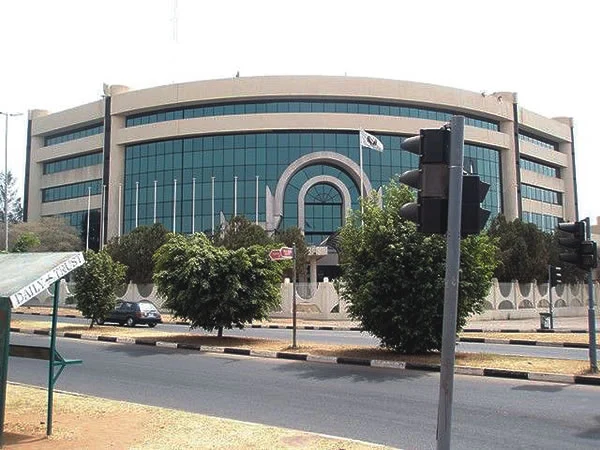Breaking News
REVEALED: Why China is building ECOWAS headquarters
Above all, the increasing commitment of the Chinese government to donating outrageous costly infrastructural facilities to African governments and nations is a clear indication of her desperation to increase influence in international politics, using Africa as a stepping stone.

The recent launch of the ECOWAS headquarters in Abuja by the Chinese government has created a distinctive argument among concerned political analysts and economists following the construction of the African Union headquarters in Addis Ababa between 2009 and 2012, which cost $200m and was funded by the Chinese government. It has led to several argumentative questions among conscious political analysts. How can a single state (China) build for the Africa Union that comprises 54 states? Why is China building for the African Union?
Since the inauguration of the African Union building in January 2012, China’s influence has grown sporadically such that a recent research study shows that China owns 35 per cent of total African trade, according to a report in October 2022. African leaders’ eyes are now on the desk of the Chinese Communist party, ensuring stronger personal relationship with President Xi Jinping to enhance the deciding factors of Chinese diplomacy, especially with their eyes on the China zero COVID-19 economic policy
ECOWAS, since its establishment in 1975, comprises the 15 countries that make up the West African region, and is headquartered in Nigeria. According to the reports of the Council for Foreign Relations in April 2018, ECOWAS and China signed a memorandum of understanding enabling the Chinese government to build a new headquarters for ECOWAS and allow Beijing, the administrative headquarter of China, to maintain the ECOWAS building for three years after construction
On December 4, 2022, ECOWAS announced the laying of the foundation for the construction of the permanent headquarters building for the commission, with a flag-off inscription boldly written in the Chinese language in Abuja which will cost $31.6m, fully financed by the Chinese government through aid from China. The building is expected to consolidate all ECOWAS operations into one single building as against the usual practice of using three different buildings all in Nigeria’s Federal Capital Territory. The new ECOWAS headquarters is to house the ECOWAS Commission, Community Court of Justice, and the ECOWAS Parliament. The President of the ECOWAS Commission, Omar Touray, thanked the Chinese government and described the gesture as a “mark of goodwill.”
While the shoddy acceptance of the Chinese ridiculous offer by the ECOWAS leadership has left many in a state of perusal, inquiring into the preoccupation of the commission, it has simultaneously led to pivotal questions such as: Why is one state like China building for 15 sovereign states of ECOWAS? Why has ECOWAS failed to build for herself an administrative headquarters since its existence for almost five decades? What does China aim to gain by building the ECOWAS headquarters?
Recall that economically, China and some of ECOWAS founding members such as Nigeria were on the same developmental pace in the late 70s and 80s when China opened up to foreign trade and investment; implementing free-market reforms in 1979 based on high growth in investment, low-cost manufacturing, exports and agricultural reforms. This was when Nigeria, a pioneer member of ECOWAS, was experiencing a massive oil boom
There have been several concerns, questions, and allegations about China’s increasing influence on the operations of ECOWAS, AU and in the politics of Africa at large. For instance, there have been allegations of spying on the AU activity. In January 2018, Le Monde, citing anonymous African Union sources, reported that data from AU computers had been transferred nightly to Shanghai servers from 2012 to 2017, and claimed this was done through the computers the Chinese government installed in the African Union building after they constructed it. The discovery of numerous bugs has also been reported at the AU headquarters. Although the AU denies most of these claims, the building of the ECOWAS headquarters by China is a similitude to the claim that China is positioning itself as a trusted friend of African nations and leaders, there are also concerns that China is building for ECOWAS to attain international recognition as the official Republic of China over the long China-Taiwan battles.
Above all, the increasing commitment of the Chinese government to donating outrageous costly infrastructural facilities to African governments and nations is a clear indication of her desperation to increase influence in international politics, using Africa as a stepping stone.
The Chinese fully-funded $58m parliament in Brazzaville, Republic of Congo in 2017; the 2016 confirmation of the Communist Party of China agreeing to build Sierra Leone’s ruling All People’s Congress party a six-story headquarters in Freetown; the building of a metro in the capital city of Ethiopia connecting the land-locked country to the ocean via the Addis-Ababa-Djibouti Railway; the 2016 construction of Morocco’s Mohammed VI bridge by Chinese group; the rebuilding of the burnt parliament buildings in Gabon; parliament buildings in Zimbabwe, Congo, Malawi, Guinea-Bissau and Lesotho, among others are all confirmations of China’s desperate move to attain a centre position in the politics and economy of Africa, and to will a certain degree of influence in the decision-making process of Africa. It is also perceived as a deliberate threat to the continued dominance of America on the African continent and an effort to overthrow the existing order.
- CollIns Akinujomu is a student of Adekunle Ajasin University










